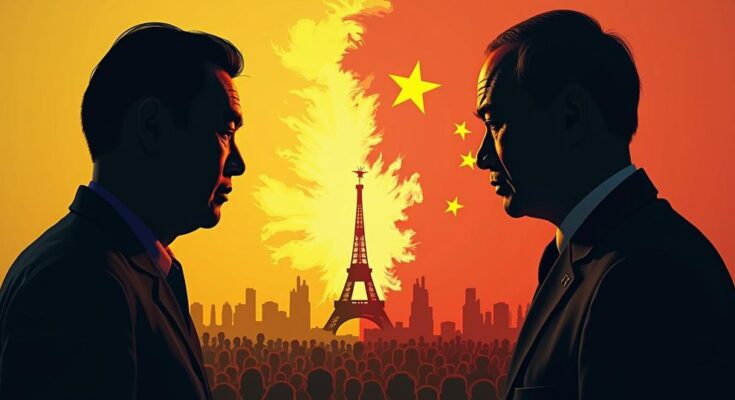China and Brazil are initiating a peace proposal for Ukraine, with support from developing nations, but face strong opposition from Ukrainian President Zelenskyy. The plan, which lacks mention of Ukraine’s territorial integrity, has been criticized by the U.S. and met with skepticism despite backing from several Global South nations. Zelenskyy contends that true peace requires Russia’s withdrawal from Ukraine.
China and Brazil are spearheading a diplomatic initiative aimed at garnering the support of developing nations for a proposed peace plan to resolve the ongoing conflict resulting from Russia’s invasion of Ukraine. However, this initiative has met with firm disapproval from Ukrainian President Volodymyr Zelenskyy, who has characterized it as favorable to Moscow, according to reports from Reuters and The Guardian. The peace framework, known as China’s “Six-Point Consensus,” has reportedly received endorsement from 110 countries, although it has been criticized for its silence on the matter of Ukraine’s territorial integrity. In stark contrast, Ukraine’s own peace proposition is grounded in international law, demanding the withdrawal of Russian forces and the return of prisoners of war and civilian captives. A recent meeting involving representatives from 17 countries was held on the sidelines of the United Nations General Assembly, chaired by Chinese Foreign Minister Wang Yi and Brazilian foreign policy adviser Celso Amorim. As noted by Wang, the discussions prioritized the prevention of escalation, the avoidance of weapons of mass destruction, and the protection of nuclear infrastructures. He stated, “Russia and Ukraine are neighbors that cannot be moved away from each other and amity is the only realistic option,” thereby advocating for a peace conference involving both nations. Despite this initiative, President Zelenskyy has expressed concern that such alternative peace proposals merely grant Russia the political latitude to prolong its military aggression. Moreover, skepticism from U.S. officials, including Secretary of State Antony Blinken, has surfaced, particularly regarding China’s alleged support for Russia’s defense industry, which he contends facilitates Russia’s continued aggression. In a notable development, ten countries from the Global South, including Indonesia, South Africa, and Türkiye, have aligned with the peace plan articulated by Brazil and China, formally signing a communique. Amorim has indicated that this coalition, dubbed the “friends for peace,” plans to continue its discussions in New York. Furthermore, South Korea’s Foreign Minister Cho Tae-yul has accused Russia of engaging in illicit arms trade with North Korea, reinforcing perspectives shared by the United States, Ukraine, and independent analysts. Cho has voiced criticism of Russia’s utilization of its veto power within the UN Security Council, asserting that it obstructs efforts for a resolution to the conflict. President Zelenskyy has labeled the China-Brazil peace initiative as detrimental, reinforcing his stance that authentic negotiations necessitate the withdrawal of Russian troops. He has urged China and Brazil to utilize their influence to halt Russian hostilities instead of advancing insufficient peace proposals. Moreover, China’s ongoing economic and political collaboration with Russia, including deepening military-technical cooperation, underscores a growing strategic relationship, despite China’s assertions of neutrality.
The ongoing conflict in Ukraine sparked by Russia’s invasion has prompted global diplomatic efforts to seek resolution. Various countries, including China and Brazil, have proposed peace plans aimed at addressing this crisis. The initiatives often encounter resistance from Ukraine, particularly regarding territorial integrity and the conditions for peace. The geopolitical dynamics, including the influence of major powers like the United States, also play a significant role in the discussions surrounding these peace proposals.
In summary, China’s and Brazil’s peace plan for Ukraine, while gaining support from over a hundred countries, has faced significant criticism from Ukrainian President Volodymyr Zelenskyy, who perceives it as advantageous to Russia. The peace framework lacks essential provisions for restoring Ukraine’s territorial integrity and has raised concerns over the continued support China provides to Russia. The international community remains divided on the validity and efficacy of these proposed peace initiatives, highlighting the complexities of diplomatic negotiations in conflict resolution.
Original Source: euromaidanpress.com




